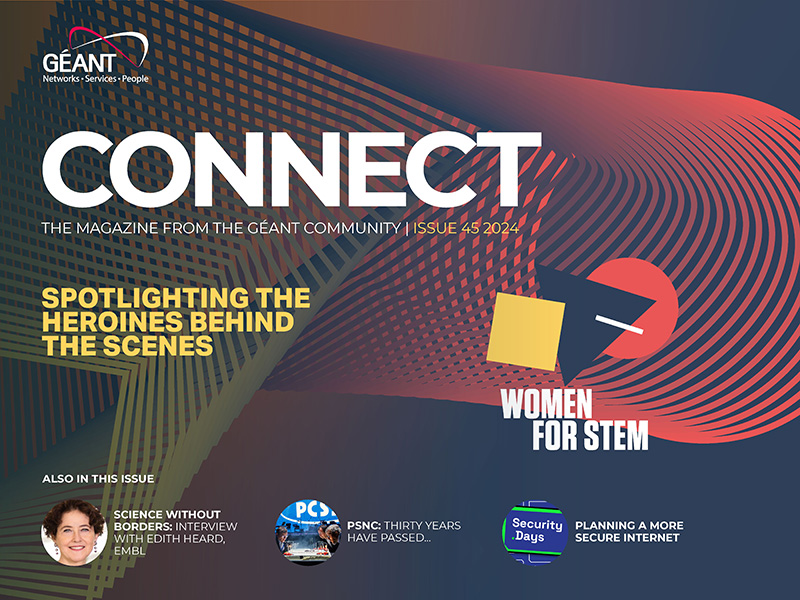This interview is part of a section on commercial cloud procurement, published in the March 2024 issue of the GÉANT CONNECT Magazine (CONNECT45). We also suggest reading “How GÉANT Cloud Frameworks outline the cloudscape of European R&E“.
Since 2016, GÉANT and the European NRENs – both via GÉANT projects and other EC-funded projects – have played an instrumental role in unlocking the innovative potential of commercial cloud services for the European Research and Education community.
The joint procurement and delivery of two very large-scale cloud framework agreements to all of Europe’s R&E institutions has been widely recognised as ground-breaking (see the article How GÉANT Cloud Frameworks outline the cloudscape of European R&E). However, in a parallel line of activities, it also worked to stimulate commercial cloud adoption across Europe, experiment with new sustainable business models, scalable funding and procurement mechanisms, and distribute cloud funding to support impactful and innovative research projects.
In this article we explore how two initiatives led by GÉANT – the OCRE project (2019-2022) and Work Package 8 of the EOSC Future project (2021-2024) – made lasting contributions to commercial cloud procurement for research and catalysed innovation by stimulating cloud adoption, and we discuss their main challenges and lessons learned with some of the GÉANT members involved.
The OCRE project (2019-2022): demonstrating demand for commercial cloud, accelerating procurement mechanisms, fostering innovation
Following the successful delivery of the 2020 IaaS+ (aka OCRE) Framework, the OCRE project moved its focus onto stimulating cloud adoption, by engaging both the demand side (research and education community) and supply side (commercial cloud and Earth Observation – EO – suppliers) and involving them in procurement activities. To this aim, the project set to distribute more than €8 million in adoption funding for Cloud and EO services to researchers and to research projects across Europe, procuring vouchers, through mini-competitions, and open calls.
The astounding response registered by OCRE open calls between 2020 and 2022 demonstrated significant demand from the research community for the consumption of commercial cloud services. Overall, the calls received 120 proposals from research projects across 22 countries in Europe, and from a wide range of research disciplines. This resulted in the funding of 37 research projects showcasing the beneficial impact of commercial cloud services on research outcomes. Success stories highlighting some of these projects are available on the OCRE website: https://www.ocre-project.eu/success-story
David Heyns: “Although the extensive response from the research community was both distributed across the region and diverse in terms of thematic focus, with regard to services we registered particular demand for the immediately scalable compute and storage capabilities available within commercial TREs/VREs (Trusted/Virtual Research Environments). These incorporate bespoke platforms and software services in support of Machine Learning (ML) and AI workloads.”
OCRE open calls also allowed the project to test procurement and funding procedures and to come up with an accelerated model, introduced in the second round of calls and then also adopted in EOSC Future. This innovative solution eliminated the dual step required in the first round, in favour of a streamlined and simplified procedure involving the direct collaboration between institutions/research projects and OCRE Framework suppliers, teaming up into joint proposals. This resulted in a significantly more effective distribution process, while also generating a pipeline of leads for suppliers and offering research projects a clearer pathway to identify the ideal solutions to their challenges.
Monique Pellinkhof: “Both in OCRE and in EOSC Future we had the opportunity to use the lessons learned from EC-funded procurements as a basis for improvements. We increased efficiency, used gained knowledge on EU regulations and towards our objectives, simplified procedures, and as such we were able to focus more on the requirements and needs of the research and education community. On the other hand, the cloud market also gained understanding of our community and started proactively reaching out, stimulated by the EC-funded cloud adoption mini-competitions.”
Commercial cloud procurement in the EOSC Future project (2021-2024): taking OCRE’s results to the next level
Commercial cloud procurement was also one of the key focus areas of EOSC Future, which (through its WP8 Commercial Services action, led by GÉANT) picked up and consolidated the legacy and work of the OCRE project, as well as of the activities within the GÉANT GN4-2 and GN4-3 projects in support of GÉANT Cloud frameworks.
Veronika Di Luna: “The main objective of our team within EOSC Future was the enablement of innovation through the interaction with the commercial sector. To that end, two tasks within the WP looked after different types of industry engagement: delivery of commercial cloud services through collective framework agreements and other procurement mechanisms, as well as a single point of contact for SMEs and start-ups as part of the Digital Innovation Hub activities. Specifically, we looked at how framework agreements such as OCRE can more quickly reach a wider user-base, not the least through the EOSC marketplace, as well as whether other commercial services would benefit from a large-scale framework.”
As a first logical step and towards the end of the OCRE project, the EOSC Future WP8 team – in collaboration with GÉANT – worked to expand access to services procured via the IaaS+/OCRE framework to an even wider audience of European researchers, by integrating them into the EOSC Marketplace. This served as a first iteration of a tested, practical, and sustainable approach to establishing and maintaining a portfolio of commercial cloud services into EOSC.
Jan Meijer: “Commercial services complement the researcher’s toolkit yet accessing them for public sector researchers usually requires public procurements, which are time consuming and expensive. Thanks to EOSC effectively creating a unified context for public sector research data and services in Europe, we can conceptualise a collective portfolio of agreements with research-relevant commercial services. Researchers can immediately use services that are part of this portfolio, because their institution’s procurement officers can trust that the agreements in it are compliant – e.g. with GDPR and procurement legislation – and represent good value for money, due to the large-scale demand aggregation. With most commodity services moving to a cloud delivery model, institutions will meet ever larger suppliers. The research community benefits from aggregating its demand to be able to get good concessions, and thanks to EOSC we now have a context to do this. However, this is very much a non-trivial exercise.”
While OCRE had focused on distributing cloud adoption funding to distinct research projects, EOSC Future adopted a different, more sustainable, approach in order to make agreements with commercial services available to all European researchers, at scale, in a reasonable amount of time. As such, the project introduced the concept of digital aggregators (e.g. non-profit entities, NRENs, Research Infrastructures and e-Infrastructures, HPC centres, etc.), as new distribution channels, able to reach thousands of institutions and a million end users.
In particular, the team published two EOSC Future calls worth €4M aiming to distribute commercial cloud services through the digital aggregators collaborating with OCRE cloud service providers, which had to craft a new approach on the distribution of commercial cloud services and make them available via EOSC. Once again building on the experience and lessons learned of the OCRE project, the EOSC Future calls used OCRE’s accelerated model to streamline procurement procedures.
Monique Pellinkhof: “From a procurement point of view, we had the opportunity to explore what it really meant to fulfil the assignment within EC terms. Of course, it wasn’t as simple as just ‘buying cloud services for researchers’: for instance, we needed to buy vouchers and explore what this implicated from a VAT perspective. However, we were also fortunate to have a certain level of harmonisation within the EU (and UK), that was essential to make the procurement possible. Overall, it was enriching to overcome the challenges we encountered along the way, and I would recommend treasuring these learnings for possible future EC-funded EOSC procurements.”
As with the OCRE calls, EOSC Future procurement calls registered consistent demand – in this case from research infrastructures. Across the two calls, EOSC Future received 22 detailed, innovative, and compelling proposals from diverse teams of digital aggregators and cloud service providers based in 11 European countries. While all proposals met minimum requirement and high-quality standards, funding allowed the project to award a total of €4 million to seven projects, based on value added to related research activities, an innovative distribution model to the end users, sustainability of the service, potential availability via the EOSC marketplace beyond exhaustion of the adoption funds.
David Heyns: “The distribution of adoption funding in the EOSC Future project demonstrated not only the ambitions of the European Research Infrastructures (RIs) to operate hybrid platforms, harnessing the bespoke services distributed by the commercial Trusted/Virtual Research Environments (TREs/VREs), but also the willingness of the cloud providers to partner and collaborate with these entities on hybrid services.”
The awarded projects – bringing advancements to diverse areas of research and enabling cloud access to valuable resources as Quantum computing, HPC, and Virtual Research Environments – are described in detail in a series of EOSC in Practice stories: https://eosc-portal.eu/eosc-in-practice/stories
Jan Meijer: “A collective portfolio of agreements with commercial services for thousands of public-sector research-performing organisations requires scalable processes for demand assessment, joint procurement and agreement delivery. Thanks to OCRE and EOSC Future we have shown how to tackle the latter two, OCRE demonstrating the successful 2nd iteration of a Europe-wide joint procurement and EOSC Future showcasing the use of aggregators to unburden researchers from the financial-administrative aspects of using the agreements. While self-financed purchases remain easier than turning EC-funding into procurement-compliant service use, we managed to demonstrate viable mechanisms to do the latter. However, as these were quite hands-on, it will be a challenge to scale them. Another challenge yet without a clear solution is assessing joint demand for services other than infrastructure-cloud, substantial enough across thousands of institutions in dozens of countries and with enough consensus on what to procure to warrant a joint procurement exercise. Infrastructure-cloud represents a collection of foundational services everyone needs and where service offerings are not too diverse, but for other service types the picture is much more varied.”
Further insights into the lessons learned in EOSC Future commercial cloud services procurement will feed into the work of the GN5-1 WP4 team that is working on OCRE 2024, the next iteration of the collectively procured framework agreements for infrastructure-cloud services.
David Heyns: “In addition, GÉANT is working to ensure that all entities participating in the EOSC, who potentially have an interest in underpinning their services with hybrid infrastructure cloud procured via the OCRE 2024 framework within the next 5 years, are listed as eligible to use the framework via their local NREN.”
The lessons learned regarding the concept of a collective EOSC portfolio of agreements with commercial services fed instead into the advancement of EOSC through the EOSC Association Task Force for financial sustainability.
Jan Meijer: “The OCRE and EOSC Future projects have given the GÉANT community a great basis to take up the role as THE provider of the EOSC’s portfolio of procurement-compliant agreements; GÉANT has the reach, the required legal basis and the experience to act as a central purchasing body for all European public-sector institutions and their researchers, providing easy access to good deals.”
Veronika Di Luna: “In conclusion, I would like to give credit to the great team involved, which brought in very broad expertise and a diverse set of personal skills. In particular, we married the specific procurement knowledge in the area of commercial cloud together with the solid understanding of the research community needs, its ways of operating, and strong relationships, mixed with an understanding of the commercial cloud market, a good grasp of the EC grant environment, and with the experience in the GÉANT and OCRE projects.”
EOSC in Practice Stories demonstrate the impact of EOSC, showcasing its collaborative essence and transformative capabilities across disciplines. Read some of the most recent EOSC in Practice stories, covering in detail the projects awarded by EOSC Future procurement calls:
- Empowering Research Communities through cross-sector data sharing, by Constanze Roedig, Head of the Austrian DataLAB and the Austrian Open Cloud Community, Vienna Scientific Cluster
- GWDG Trusted Research Environment (TRE): Empowering European Research through AWS Cloud Services , by Piotr Kasprzak, Cloud Engineer at GWGD – Gesellschaft für wissenschaftliche Datenverarbeitung mbH Göttingen
- QCloud – Ireland’s quantum cloud environment, by Hazel Murray, PhD and Cybersecurity Lecturer at MTU – Munster Technological University
 This article is featured on CONNECT 45, the latest issue of the GÉANT CONNECT Magazine!
This article is featured on CONNECT 45, the latest issue of the GÉANT CONNECT Magazine!
Read or download the full magazine here




